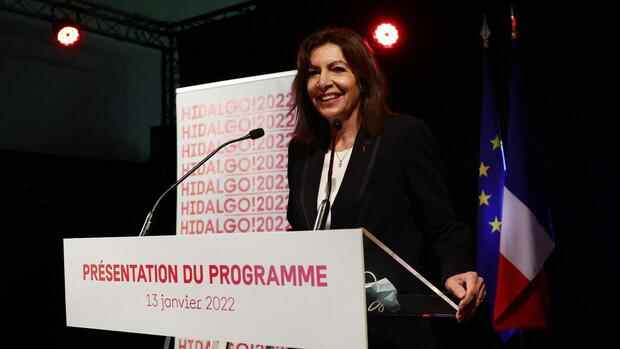Paris Much is at stake for Anne Hidalgo: the presidential candidate of the French socialists submitted 70 proposals on Thursday to combat the “social, ecological and democratic emergency” she had identified in the country.
Above all, however, she reacted to her own plight in the election campaign by sharpening her positions: The presidential program could be Hidalgo’s last chance to give her campaign something like a boost less than three months before the election.
Five years ago, after François Hollande’s term in office, the socialists lost power. Now Hidalgo is bobbing between two and five percent in polls for the first ballot in early April. While in the Federal Republic of Germany the SPD is again the Chancellor after more than 15 years and the Greens are also part of the government as the second strongest force in the traffic light coalition, the left-wing camp in France is in a deep crisis.
Hidalgo’s election manifesto contains promises such as an increase in the minimum wage, investments in education, state subsidies for energy-efficient building renovation and the creation of tens of thousands of new jobs in the health system. She puts the costs at a total of 50 billion euros.
Top jobs of the day
Find the best jobs now and
be notified by email.
Two days before the presentation of her program, Hidalgo enters a bistro near the Élysée Palace in Paris. The candidate will meet journalists there, and the main focus will be on her European political plans. But then she also speaks in detail about the situation of her party and the division of the country, for which she blames one man in particular: Emmanuel Macron.
The president once belonged to the socialists and was Minister of Economics under Hollande. When the latter refused to run for a second term due to poor popularity ratings, Macron won the election in 2017 with a new center party.
Macron and the “cult around his person”
“Macron said at the time that there would be no right or left from now on,” says Hidalgo. As a substitute, however, he did not propose a political project, but only “the cult around his person”. She considers the view that Macron is a kind of liberal social democrat, widespread in Germany and other European countries, to be a major misunderstanding.
According to Hidalgo, the head of state is a “neo-liberal” and has lowered taxes for the rich in his fundamental economic and political convictions. In addition, Macron surrounds itself only with a “small group of top officials” and maintains an “authoritarian” style of government. Counterweights by parliament or civil society are not desired.
But Hidalgo also polarizes. As mayor of Paris, she drove the traffic turnaround at 30 km / h and bicycle streets, which earned her the reputation of being a car hater, especially in rural areas. Critics accuse the 62-year-old of standing for an urban left that has lost touch with traditional voters in the workforce.
Hidalgo failed in an attempt to convince all applicants on the political left of Macron to have a primary. The socialist had hoped to run as the unity candidate of the left – although it is very questionable whether she would have emerged victorious from this vote at all.
In the polls for the presidential election, the 70-year-old consistently achieved the highest values among all applicants from the left-wing camp.
(Photo: Reuters)
The disinterest with which the competitors reacted to the pre-election idea underscores the socialists’ loss of importance. The former People’s Party provided two presidents: François Mitterand from 1981 to 1995 and then Hollande from 2012 to 2017. Traditionally, the left-wing camp gathered behind the socialist presidential candidate in the runoff election.
France’s left is fragmented
Meanwhile, France’s left is so fragmented that not even the socialists really pull together. Hidalgo is the party’s official candidate, but the former minister of labor and Hollande’s former justice minister are also running. The Greens and their candidate Yannick Jadot are between five and eight percent in surveys.
A communist, a Trotskyist, an anti-capitalist and Jean-Luc Mélenchon are jostling on the left. Mélenchon used to be with the socialists, then he founded a left-wing populist and EU-skeptical protest party.
In his election campaigns, he sometimes uses peculiar technical means: In 2017, he had himself projected onto the stage as a hologram in several places at the same time. This year Mélenchon is planning what it claims to be the first “olfactory” campaign appearance in the world – with fragrances that are tailored to the candidate’s speech.
Mélenchon may seem bizarre: In the polls for the presidential election, however, the 70-year-old consistently achieved the highest values among all applicants from the left-wing camp. Demoscopes see him at around ten percent, more than twice as much as Hidalgo.
Together, the left have a good 25 percent, which corresponds to the Macron polls. In a runoff election, like 2017, the president is likely to meet right-wing populist Marine Le Pen or bourgeois-conservative candidate Valérie Pécresse.
Hidalgo refuses to admit that: “In France, the republican left, for which I stand, is indispensable,” she says. “Without them it wouldn’t be the same country.”
More: Omikron wave overshadows the election campaign in France
